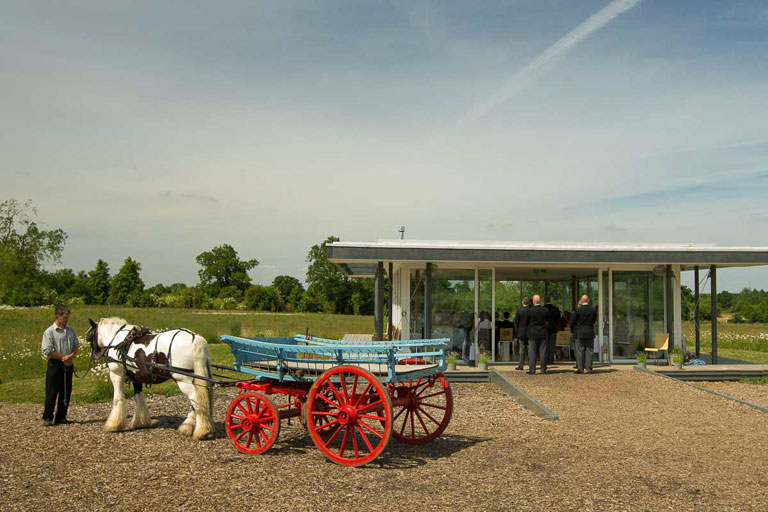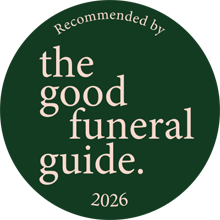When a family member dies without leaving behind a Will, or you begin planning your own funeral, you’ll face many important decisions. One of the most significant is choosing between burial and cremation. There’s no single right answer – the choice depends on your family’s beliefs, values, practical considerations, and budget. At White Rose Modern Funerals, we help families across South West London and Surrey navigate this decision every day with flexibility and understanding. Here’s what you need to know.
Understanding Your Options
Burial has traditionally been the most utilised form of body disposal for centuries. It involves interring the coffin below ground (or more rarely at sea). This creates a permanent, physical resting place that families can visit.
Cremation involves turning the body into ashes following exposure to extremely high levels of heat at a crematorium. In the UK, cremation is now chosen for more than 80% of funerals, making it by far the most common option. The ashes (officially termed cremated remains) are returned to the family, typically within a few days.
Unlike traditional funeral directors who often present rigid packages, we believe in giving you complete choice over how you honour your family member, whether that’s through burial, cremation, or the many personalised options available within each.
What Matters Most to Your Family?
Location and visiting preferences often influence this deeply personal decision. Some people prefer burials as they like the idea of the physical form of their family member remaining at a particular site. Once the body is buried, that will be the final resting place – so if you decide to move away from South West London or Surrey, or relocate abroad, visiting may become more difficult.
Cremation offers a huge degree of flexibility for family and friends. Ashes can easily be moved from one venue to another via an urn, or scattered in one or more places that have special meaning. Sometimes families are unsure what to do with the ashes after a cremation, however there are many beautiful options – from keeping them in a decorative urn at home, to interring them in a cemetery plot (which requires less space than burial), placing them in a columbarium niche, dividing them among family members, or scattering them in meaningful locations such as the River Thames.
The type of farewell service you envision matters too. Both burial and cremation can be accompanied by beautiful, meaningful services that celebrate a life well-lived. The funeral service itself – the element that brings family together to remember and honour your family member – can be similar whether you choose cremation or burial. We work with families to create services that feel right, whether that’s ceremonial, simple, or somewhere in between.
Religious and Cultural Considerations
Your faith or cultural background may significantly influence this decision, and we respect and support whatever path feels right for your family.
Many Christian denominations across South West London and Surrey accept both cremation and burial, though some families prefer burial based on traditional beliefs. The Catholic Church now permits cremation, though burial remains the preferred option. If you’re choosing cremation, Catholic teaching requests that ashes be kept intact and buried or interred rather than scattered.
Islamic and Jewish traditions generally require burial, typically within 24 hours of death. Cremation is not permitted in these faiths, and we work sensitively with families to arrange burials promptly and respectfully.
Hindu, Sikh, and Buddhist families typically choose cremation, which holds spiritual significance in these traditions.
If the person who died did not leave instructions as to their preferred method of body disposal but followed a particular religion, it’s worth looking into the ideology of this faith before you choose burial or cremation.
Environmental Principles
Secular values can have an impact on this decision too. If your family member was concerned about preserving the environment, it’s worth considering the eco-implications of each body disposal method.
Burials do take up important space on land if at a cemetery, but eco-friendly natural burials in particular lead to natural decomposition. Natural burial grounds are becoming increasingly available in Surrey and the surrounding areas, offering a gentler environmental footprint.
Cremation, unlike natural burial, uses energy to burn the body and releases emissions into the air. However, cremation procedures are becoming greener as technology improves. There are new developments in the pipeline such as alkaline hydrolysis (also called resomation or water cremation), which uses less energy than flame cremation. While it’s highly likely that burial or cremation will be the primary choices for the foreseeable future, these innovations show the funeral sector is evolving.
If environmental considerations are important to you, we can discuss biodegradable coffins, natural burial options, and the most eco-conscious choices available in your area.
Understanding the Costs
Budget is an important practical consideration for most families, and there are significant cost differences between burial and cremation. Price is worth taking into consideration before you make a decision on how to dispose of a body.
Cremation is generally less expensive and offers several options:
Direct cremation is the cheapest form of body disposal available. This involves cremating the body at a time convenient for the crematorium, without a funeral service. It can save you money, but will not have the same personal touch as an attended burial or cremation. For this reason, many families prefer an attended simple cremation without any fuss or ceremony – you get the cost benefits while still gathering to say goodbye.
A simple attended cremation in South West London or Surrey typically can cost as little as £2,750, which includes the crematorium fees, a coffin, and funeral director services. You can choose to have a service at the crematorium, hold a memorial service later, or create something completely unique.
Burial costs are typically higher and more variable. Burials are the most expensive option, largely due to the cost of buying a burial plot. Cemetery plot fees in South West London and Surrey can be around £3,500 (or significantly more if the person who died is classed as ‘non-resident’ for the specific cemetery chosen). This doesn’t include the cost of the coffin, digging the grave (interment fees are typically around £1,000 or more) and a headstone or memorial.
Exact prices will vary depending on the choices you make – and there are significant regional variations even within our area.
Practical Considerations for South West London and Surrey Families
Cemetery space is increasingly limited, particularly in central areas like Teddington, Twickenham, Richmond, and Kingston. If having a permanent place to visit is important to your family, it’s worth exploring options early. Some local cemeteries have waiting lists or limited availability.
Time and flexibility matter during difficult times. Cremation allows for more flexibility in timing your funeral service. You might hold a service before the cremation, or arrange a memorial or celebration of life service weeks later when distant family can attend from abroad or other parts of the UK. Burial typically requires more immediate planning, though this can also provide structure and purpose when you need it most.
Future mobility shouldn’t be overlooked. Many families in our area are mobile – children may live elsewhere in the UK or abroad, or you may have plans to relocate in retirement. If family members may move away from South West London, ashes offer portability that a burial plot doesn’t. Ashes can be divided among family members, scattered in meaningful locations, or transported more easily than a burial plot can be accessed from afar.
Making the Right Choice for You
There’s no right or wrong answer when it comes to deciding between a burial or a cremation. It completely depends on your preferences, budget and principles. In any case, it’s never a decision that should be rushed.
Some questions to reflect on:
Where do you feel most connected to your family member’s memory – at a specific grave, scattered in nature, or carrying their memory in your heart regardless of physical location?
Did your family member express a preference? Many people share their funeral wishes with family or include them in their Will or pre-planning documents.
What will bring your family comfort in the years ahead? Some find great solace in visiting a grave, while others feel equally close to their loved one through memories and rituals that don’t require a specific location.
How do you wish to remember and honour them? We believe funerals should be as individual as the lives they celebrate.
We’re Here to Help – Without the Stuffiness
At White Rose Modern Funerals, we take a different approach from traditional undertakers. We don’t believe in rigid packages or one-size-fits-all solutions. Instead, we listen to what matters to you and help you create a farewell that feels authentic and meaningful, whether that’s simple and understated or a full celebration of life.
We know that choosing between cremation and burial is a significant decision, but you don’t need to make it in isolation. We’re here to discuss your options without pressure, answer your questions clearly and honestly, and help you find the choice that honours your family member and brings you peace of mind.
Whether you’re in Twickenham, Richmond, Kingston, Wimbledon, Surrey, or anywhere across South West London, we’re here to support you with approachability and genuine care.
For further guidance and advice, give our team a call on 020 3281 1045. We can help you make the right choice for you or your family member, and we’re always happy to have an informal chat about your options.
If you found this helpful, you might also be interested in reading about what to do immediately after a loved one passes away, understanding funeral costs in South West London and Surrey, or exploring eco-friendly funeral options. Our office is located in central Twickenham, and we serve families throughout the local area.



